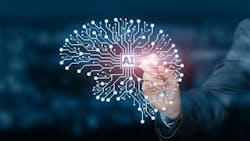Bridging the AI Divide: Lessons from Integrating Technology in Skilled Trades
AI is reshaping our world, profoundly impacting the workforce across all sectors. Tech giants like IBM are at the forefront, integrating AI into their operations and setting benchmarks for others. From healthcare to manufacturing, AI's ability to analyze vast datasets and enhance decision-making processes marks a revolution.
But not every industry is poised to embrace such a seismic shift from the status quo.
Traditional skilled tradespeople like plumbers, electricians, and HVAC technicians, with their “if it ain’t broke, don’t fix it” mentality, are a prime example. Many trades still prefer traditional methods—pen and paper over digital solutions—and are hesitant to adopt new technologies like AI. This reluctance is not just a stubborn resistance to change but often a response to perceived risks and the undervaluation of new technologies.
This hesitance underscores a crucial lesson in integrating AI thoughtfully across all sectors, emphasizing that the journey is as important as the technology itself. At BuildOps, we have encountered many customers who are transitioning away from manual processes to our AI-powered all-in-one SaaS platform. The key to successful adoption lies in understanding and addressing customers’ specific needs and concerns.
Building Trust Through Innovation
For those of us leading SaaS companies, the goal isn’t just innovation; it’s innovating in ways that build, not break, trust and satisfaction among our customers. We aim to develop solutions that enhance, rather than disrupt, customer trust and satisfaction. Innovating responsibly means understanding the ecosystem our customers operate within—respecting the workflows that have served them well and introducing AI as a natural extension rather than a disruptive force.
This means creating tools that meet our customers where they are, rather than where we think they should be. The adoption of new AI-powered tools is contingent upon these tools complementing, not replacing, the human element. Our work with tradespeople has emphasized the role of AI as an empowerment tool, not a replacement.
Transforming Challenges into Opportunities
Overcoming challenges and transforming them into opportunities for better efficiency and productivity is crucial. For instance, we built an AI-powered feature that ensures all customer-facing documents are error-free, which can be a game-changer, especially for technicians for whom English might be a second language. This feature doesn't remove humans from the equation; instead, it enhances their efforts and allows them to focus on their craftsmanship.
A Strategic Approach to AI Integration
From our experience, we've identified a straightforward path for integrating AI that benefits the trades and can be applied universally across industries. This approach is centered on principles that boost customer experience and business results:
Prioritizing Impact
Focus on AI implementations that deliver tangible benefits. AI-driven predictive maintenance, for example, can minimize downtime by predicting equipment failures before they occur, directly improving operational efficiency and customer satisfaction.
For instance, by implementing AI-driven predictive maintenance in manufacturing, companies can reduce downtime by anticipating machinery failures before they occur. This not only enhances efficiency but also significantly improves the overall customer experience by ensuring reliability and minimizing disruptions.
Listening to Customers
Successful AI tools are developed with continuous customer input. By placing the user at the heart of product development, AI tools are crafted to be intuitive and responsive, ensuring they complement the user’s daily routines and enhance productivity. This collaborative approach ensures that the AI solutions provided are not only adopted but also loved by the end-users.
Consider collection methods like surveys, focus groups, and user forums.
Enhancing, Not Replacing
AI should amplify human skills, not replace them. Automation of routine tasks like scheduling and data entry allows workers to focus on higher-value activities, thereby enhancing their productivity and job satisfaction. This strategy ensures that AI is embraced as a partner in the workflow.
Collaborative Learning
Adoption is driven by understanding. Providing comprehensive training resources and real-time support can demystify AI for users, easing the transition and maximizing the benefits of new technologies.
Educational initiatives like webinar series, detailed user manuals, and AI academies can personalize learning and adapt to user feedback for continuous improvement.
Respecting Individual Journeys
Tailor AI adoption to the specific needs and readiness of each customer—think AI à la carte. Offering scalable solutions—from basic automation tools to advanced analytics—allows businesses of all sizes to find the right fit for their operations, encouraging gradual and willing integration of AI technologies.
For example, your SMB customers might prefer basic AI tools for inventory management, while a larger enterprise customer might deploy advanced AI analytics across its operations.
AI as a Catalyst for Positive Change
Introducing AI into SaaS, for the trades or any industry, is fundamentally about enhancing the human experience alongside technological advancement. By adhering to these principles, we lead transformative changes that build deeper trust and loyalty among customers. Our future-focused innovations are designed to not only navigate the current technological landscape but also to set new standards for the integration of AI, ensuring that it serves as a bridge to better human interactions and not a barrier.
As we continue to refine these AI systems, our iterative improvements will consistently enhance user experiences, making these systems even more indispensable to our customers.
It’s indisputable that AI's role in business will expand, making its integration today a foundational step for the leaders of tomorrow. This future-proof approach will not only foster more trust and loyalty but will also set a standard for how businesses can humanize technology in a way that genuinely benefits all, including the slowest-moving industries.
Alok Chanani is the Co-founder and CEO of BuildOps and a former US Army Captain.
About the Author
Alok Chanani
Alok Chanani is the Co-founder and CEO of BuildOps and a former US Army Captain.
